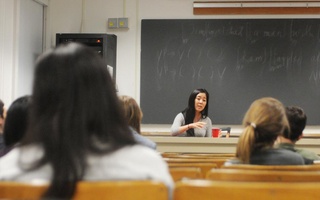A medical malpractice suit brought against two doctors at a Harvard-affiliated hospital on behalf of a deceased Harvard professor was resolved Friday, ending in the exonerations of the doctors and awarding no damages to the plaintiff after nearly five years of legal battles.
In May 2002, renowned evolutionary biologist Stephen J. Gould died at age 60 from lung cancer just 10 weeks after doctors found the tumor, which had already spread to his liver, brain, and other organs. His wife, Rhonda Roland Shearer, brought suit three years later, claiming that the lesion that became cancerous was already evident in an X-ray taken of Gould’s chest in Feb. 2001.
Shearer named three doctors in the suit—Rebecca L. Dyson, who had examined chest X-rays taken in Feb. 2001 at Harvard-affiliate Brigham and Women’s Hospital; Harvard Medical School professor Robert J. Mayer, an oncologist at the Dana-Farber Cancer Institute who had been Gould’s physician since 1993; and Salvatore G. Viscomi, who was exonerated earlier.
After deliberating for nearly five hours, the jury determined that neither doctor had been negligent, according to a clerk at the Mass. Middlesex Superior Court, where the trial was held.
“We are grateful that the jury looked at all the evidence and confirmed our view that Dr. Mayer provided high quality, appropriate, and compassionate care,” Dana-Farber spokesman Steven R. Singer said.
Mayer and Dyson’s lawyer William J. Dailey, Jr., credited the win to “very strong expert testimony on the part of the defendants indicating that they had complied with all practices at all times.”
The suit has been in the works since it was first filed in May 2005, and the trial itself lasted three weeks—an average length of time for a medical malpractice suit, according to the court’s clerk.
Gould had battled serious health issues earlier in his life. In 1982 he was diagnosed with abdominal mesothelioma, a cancerous growth in the tissue coating many organs that usually comes about as a result of asbestos exposure.
Gould recovered from the mesothelioma and “functioned at a very high level,” according to Dailey. Doctors at Dana-Farber, including Mayer, continued to follow Gould’s health. But Gould also suffered from small bowel obstructions, which Dailey described as painful and debilitating intestinal blockages, and was hospitalized in New York in March 2002 for his sixth such obstruction when the lung cancer was ultimately found, already at the final stage of progression.
Gould, a winner of the National Book Critics Circle Award for “The Mismeasure of Man,” developed the theory known as “punctuated equilibrium,” which describes evolution as a sporadic, jerky process over a period of time rather than a smooth, gradual change in traits.
According to past Crimson coverage of the lawsuit, Gould was accustomed to a seven-figure income and was in the process of negotiating a $2 million book contract.
Mayer cared for Gould for nine years. Over that time, “they developed a close relationship and [Mayer] greatly admired and respected his patient,” read the statement released by Dana-Farber in 2005.
Neither Shearer, who runs the media watchdog site stinkyjournalism.org, nor her lawyer Alex H. MacDonald, could be reached for comment.
—Staff writer Elyssa A. L. Spitzer can be reached at spitzer@fas.harvard.edu.
This article has been revised to reflect the following correction:
CORRECTION: January 26, 2010
An earlier version of the Jan. 26 news article "Gould's Doctors Cleared By Jury" stated that Rhonda Roland Shearer runs the media watchdog site stinkyjournalism.com. In fact, the site's address is stinkyjournalism.org.
Read more in News
Urban Garden To Fill Empty LotRecommended Articles
-
Desaulniers Captures National Crown Sanchez Suffers The Agony of De-FeetIt was not surprising that Mike Desaulniers took home the biggest silver cup at the National Singles Squash Championships yesterday,
-
 Making Change
Making Change -
Harvard Doctors Accept Fewer Speaking Engagements As Restrictions TightenThe total amount of money pharmaceutical companies paid Massachusetts doctors promoting their products decreased in recent years.
-
ES 227 Spotlights Medical TechnologyThe class, which was offered for the first time last spring, is the brainchild of SEAS Lecturer Conor J. Walsh, who said he was inspired by a similar class taught by his MIT graduate advisor.
-
HMS Revises Pay StructureIn an effort to respond to what one hospital executive termed a “primary care crisis,” two Harvard-affiliated teaching hospitals will shift their pay structure so that doctors are paid in part based on the number of patients they treat.
-
 Doctors Describe Tough Work, Life Balance
Doctors Describe Tough Work, Life Balance













